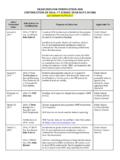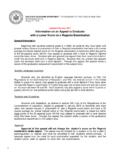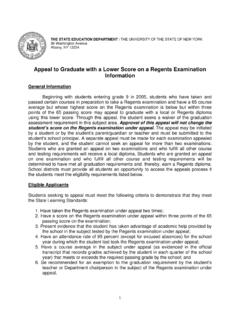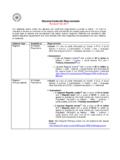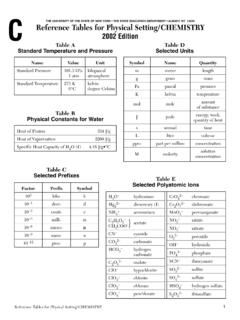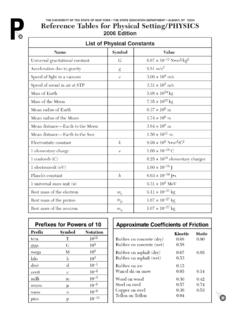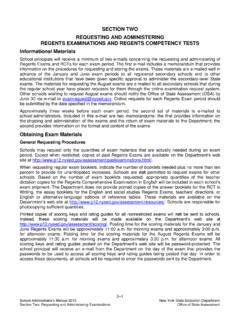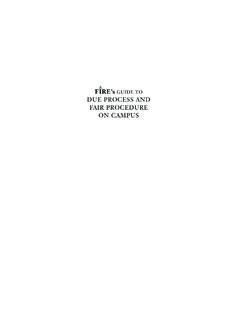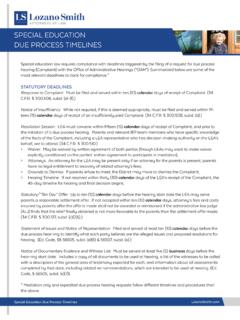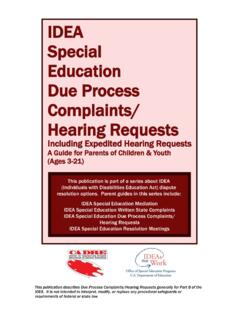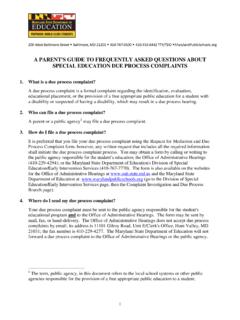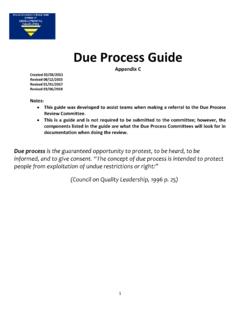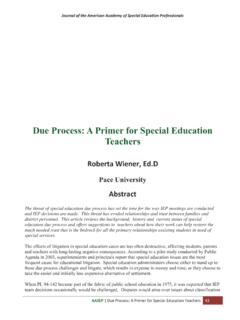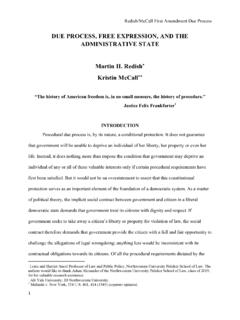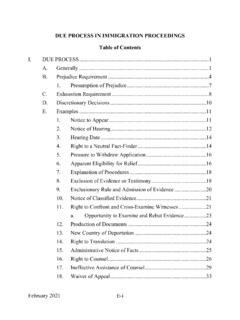Transcription of Q and A on Impartial Due Process Hearings - p12.nysed.gov
1 New York State Education Department Office of Special Education QUESTIONS AND ANSWERS ON Impartial DUE Process Hearings FOR STUDENTS WITH DISABILITIES January 2018 The State Education Department does not discriminate on the basis of age, color, religion, creed, disability, marital status, veteran status, national origin, race, gender, genetic predisposition or carrier status, or sexual orientation in its educational programs, services and activities. Portions of this publication can be made available in a variety of formats, including Braille, large print or audio tape, upon request. Inquiries concerning this policy of nondiscrimination should be directed to the Department s Office for Diversity, Ethics, and Access, Room 530, Education Building, Albany, NY 12234. 1 Impartial HEARING Process FOR STUDENTS WITH DISABILITIES TABLE OF CONTENTS Page INTRODUCTION.
2 2 A. REQUESTING AN Impartial HEARING .. 4 B. APPOINTMENT OF AN IHO .. 7 C. RESOLUTION PERIOD .. 8 D. Impartial HEARING PROCEDURES .. 11 E. Impartial HEARING OFFICERS .. 16 F. EXPEDITED Impartial Hearings .. 17 G. Impartial HEARING DECISIONS AND APPEALS .. 18 2 INTRODUCTION Consistent with the Individuals with Disabilities Education Act (IDEA), the New York State Education Department ( nysed ) has established due Process procedures that provide specific options for concerns or disagreements that arise between parents1 and school districts about the identification, evaluation, educational placement of, or the provision of a free appropriate public education (FAPE) to, a student with a disability or a student suspected of having a disability. nysed encourages school districts and parents to work cooperatively to resolve disagreements that may occur through non-adversarial means whenever possible.
3 For example, parents may contact their child s teacher or ask for a meeting with school administrators or the Committee on Preschool Special Education (CPSE) or Committee on Special Education (CSE) to discuss concerns about their child's education. Mediation When disagreements cannot be resolved through informal means, parents or school districts may request special education mediation. Mediation is a voluntary Process in which parents of students with disabilities and school district personnel meet with a specially trained, Impartial individual ( , a mediator) to resolve disputes that may arise about a student s special education program. A qualified and Impartial mediator conducts the mediation sessions but does not issue a decision. An agreement reached by the parents and the school district is set forth in a written mediation agreement, which is binding upon the parties.
4 All discussions that occur during the mediation Process must be confidential and may not be used as evidence in any subsequent due Process Hearings or court proceedings. Mediation is generally a less expensive, less time-consuming alternative to dispute resolution for both parties, allows the parties to discuss the issues and work together to develop a mutually agreeable solution and is a highly effective Process in resolving issues related to special education matters. For more information on the mediation Process , refer to nysed s Special Education Mediation webpage. ( ) State Complaints If a parent, individual or organization believes that a school district or public agency has violated a requirement of the IDEA, the federal regulations or State law/regulations related to the education of students with disabilities, they may submit a written, signed State complaint to nysed .
5 The State complaint must allege a violation that occurred not more than one year prior to the date that the State complaint is received. Upon receipt of a written complaint by an individual or agency, nysed must determine if the alleged violation occurred and issue a written decision of its findings within 60 calendar days of receiving the State complaint. For more information on State complaints, refer to the New York State Complaint Procedures Questions and Answers. ( ) 1 Parent is generally defined as a birth natural or adoptive parent, a guardian, a person in parental relationship to the child or a surrogate parent (8 NYCRR (ii)) 3 Impartial Hearings The parents or a school district may request an Impartial due Process hearing (referred to as an Impartial hearing throughout this document) on any matter relating to a proposal or a refusal to initiate or change the identification, evaluation or educational placement, or the provision of FAPE to a student.
6 An Impartial hearing is a formal Process in which the parties ( , the parents and the school district) present their case and refute evidence before an Impartial hearing officer (IHO) who issues a written decision. The IHO is not an employee of the school district or nysed and is specifically trained to hear and decide special education cases. The IHO s decision is legally binding and enforceable in any State court of competent jurisdiction (a State court that has authority to hear this type of case) or in a federal district court of the United States. Overview of the Impartial Hearing Process 1. Either the parent or school district requests an Impartial hearing relating to a disagreement on a special education matter. 2. The school district informs the parent of the availability of mediation, provides the parent with a copy of the Procedural Safeguards Notice, and informs the parent of any free or low-cost legal or other relevant services available in the area.
7 3. The school district selects the IHO through a rotational selection Process in accordance with regulatory timelines. The board of education immediately appoints the IHO. 4. The school district convenes a resolution meeting for a parent requested hearing. 5. The IHO presides over the hearing at which the parties have an opportunity to present evidence and testimony. 6. The student remains in his or her current placement during the Impartial hearing proceedings (unless the parents and school district otherwise agree and except as otherwise provided for expedited Impartial Hearings for certain disciplinary suspensions or removals of a student). 7. The IHO makes a decision and mails the finding of fact and decision to the parties and to nysed in accordance with regulatory timelines. 8. The decision of the IHO is final unless appealed to a State Review Officer (SRO) of nysed . The following Questions & Answers (Q&A) provide responses to frequently asked questions about the Impartial hearing Process in New York State and compliments the federal and State legal and regulatory requirements by assisting all parties to better understand their responsibilities relating to Impartial Hearings so that disputes over special education are resolved in a legally compliant and timely manner.
8 These responses are provided as informal guidance and are not legally binding but represent the interpretation by nysed of applicable statutory and regulatory requirements and the circumstances presented. 4 A. REQUESTING AN Impartial HEARING [8 NYCRR2 Sections (i), (j) and ] 1. How does a parent request an Impartial hearing? A parent requests an Impartial hearing by writing to the board of education of the child s school district. Any administrative official or other personnel of the school district who receives the written request (also known as a due Process complaint notice) must forward it immediately to the board of education, so the school district can immediately, but in no case later than two business days after the receipt of the request, initiate the Process to select the IHO. 2. How long does a parent have to file a due Process complaint?
9 The request for an Impartial hearing must be submitted within two years of the date the parent or agency knew or should have known about the alleged action that forms the basis of the due Process complaint, except that the two-year timeline shall not apply to a parent if the parent was prevented from requesting the Impartial hearing due to specific misrepresentations by the school district that it had resolved the problem forming the basis of the due Process complaint or the school district s withholding of information from the parent that was required to be provided to the parent. 3. If a parent verbally requests an Impartial hearing at a CSE or CPSE meeting, does he or she still need to submit the request in writing? Yes. The request for an Impartial hearing must be in writing. 4. What information should a parent provide in the written request for an Impartial hearing?
10 The written request for the hearing must include information that describes the nature of the problem and facts relating to the problem, as well as a proposed resolution of the problem, to the extent known and available to the parent at the time of the written request for the hearing. A request for hearing is deemed sufficient unless there is an allegation that it is not. It is important for the parent or the attorney representing the parent to provide the school district with specific information about the student and the basis of the dispute. This notice to the school district will provide the school district with an understanding of the parent s concerns and may result in the school district and the parent working together to resolve the problem, possibly removing the need to proceed to an Impartial hearing. The parent, or the attorney representing the parent, may not have a hearing unless the written request for the hearing includes the required information.
